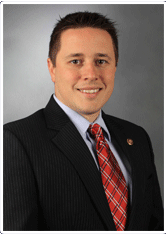JEFFERSON CITY, Mo. — Legislation that would end tax incentives for businesses that cross state lines within the Kansas City Metro area was heard before committee in the House and the Senate today, marking surprising coordination between lawmakers seeing to end the ‘Border War’ with neighboring Kansas.
House Speaker Tim Jones, R-Eureka, who sponsors the language in the House, says that businesses in the Kansas City area are collecting generous incentives from both states by “shuffling” existing jobs across state lines without creating any new, net job growth. Jones, citing a Hall Family Foundation study, says that the two states spent a combined $212 million on incentives for businesses that resulted in almost no real growth in jobs.

Legislation offered by Jones and Kansas-City area Republican Sen. Ryan Silvey would end incentives for businesses moving between specific KC metro-area counties.
Kansas counties Douglas, Johnson, Miami, and Wyandotte and Missouri counties Jackson, Clay, Platte, and Cass are included in the bill. Any business moving from one of these counties across state lines into another would be ineligible for incentives. The legislation in both the House and Senate is contingent on Kansas enacting an identical law, effectively creating a “cease fire,” according to Jones.
“By working with our counterparts in Kansas rather than against them, it’s my hope we could end this boarder war,” Jones said.
The bill also does not affect expanding businesses, but is specifically targeted to businesses packing up and moving.
In the Senate, Silvey touted similar arguments, with he and Jones hoping for consent status on the legislation. Silvey’s bill is co-sponsored by Democrat and fellow Kansas City area Sen. Jason Holsman, which Silvey says is a sign of the bi-partisan nature of the issue. The Missouri and Kansas Chamber’s of Commerce both testified on their support of the bill, and Chris Pieper, senior legal and policy advisory to Gov. Jay Nixon, said Nixon was also looking to use executive authority to place a moratorium on discretionary incentives as part of a deal with Kansas Gov. Sam Brownback.
Neither bill experienced opposition in committee. Coordination between House and Senate priorities — which has been uncommon — along with broad support from the Governor could mean it is one of the first pieces of legislation that finds its way to Nixon’s desk.
“We have a chance here to work on a bill that has very broad support from a lot of people,” Silveys said. “And it is an opportunity to put an end to something wasteful and start to encourage real growth.”
Collin Reischman was the Managing Editor for The Missouri Times, and a graduate of Webster University with a Bachelor of Arts in Journalism.



